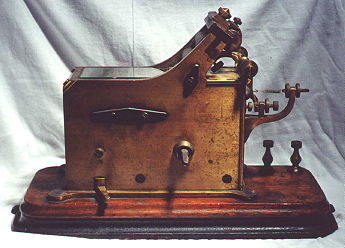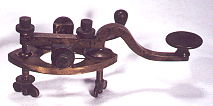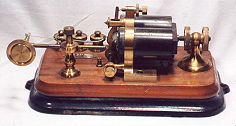1879 was a transitional year for Phelps. Western Union's management decided to discontinue the manufacturing of their own instruments and sold its New York factory to The Western Electric
Manufacturing Company. Western Union already had a one third interest in the firm. This year would mark the end for instruments made by Phelps for
Western Union. Phelps would remain with Western Union as their only inventor conducting
experiments and evaluations until his retirement. The company's experimental shop was also put under his direction.
Its important to note that the Phelps
name associated with the manufacture of telegraph instruments would actually continue after 1879.
 The new Superintendent of The Western Electric Mfg. Co. factory was his son, George M. Phelps Jr.,
who previously worked as his father's assistant at Western Union and prior to that a
bookkeeper at American Telegraph. He too would become widely recognized in the Telegraph
industry and later became a co-editor of the publication, The Electrical Engineer with Franklin Pope. George Jr. was born and educated in Troy, N.Y.. He was a charter member of The American Institute of Electrical Engineers in 1884 and was their elected Treasurer 1887-1895.
The new Superintendent of The Western Electric Mfg. Co. factory was his son, George M. Phelps Jr.,
who previously worked as his father's assistant at Western Union and prior to that a
bookkeeper at American Telegraph. He too would become widely recognized in the Telegraph
industry and later became a co-editor of the publication, The Electrical Engineer with Franklin Pope. George Jr. was born and educated in Troy, N.Y.. He was a charter member of The American Institute of Electrical Engineers in 1884 and was their elected Treasurer 1887-1895.
In 1879, James D. Reid's book, The Telegraph in America was published. It is considered one of the most comprehensive works ever written documenting the history of the telegraph industry in the United States to that date.
Reid profiles only three, "prominent inventors of the day" in his book. They were: Elisha Gray, Thomas Edison, and George Phelps.


Phelps / Western Union, spring-driven register, 1870's:
This instrument also imprinted the dots and dashes of Morse code on a narrow strip of paper. Phelps protected the register's internal parts by enclosing the register in a brass frame. An operator could still inspect them by looking through the top and end glass covers. The photo on the right shows its internal gears and governor preserved by this design.
All of the instruments Phelps made throughout his career  were of the highest quality.
There was no such thing as a low end Phelps instrument. He set the quality standards not only
by design but by the authority of his position with Western Union. Many of his Morse instruments
were Western Union "standards" or "approved" models/patterns. Western Union used his instruments in many of their offices throughout the U.S. This would possibly explain why other
Makers marketed seemingly look-a-like models. It is the opinion of this writer that the Phelps camelback key was simply his artistic and functional creativity being applied to an old design.
Along with his classic lever design, he relocated and modified the spring tension adjustment previously found
on the camelback key of Mr.Chubbuck of Utica, N.Y.. He moved this adjustment to a central point on the lever. This move would
influence future key makers for decades. Most subsequent key designs used in landline telegraphy and later, for radio, were built this way. Consider this insight by Franklin Pope about Phelps' influence on telegraph instrument design:
"The standard
American Morse relay of the present day, [1888] is another simple but eminently characteristic
example of his [Phelps'] skill in the adaptation of novel, convenient and tasteful designs to old
devices."
were of the highest quality.
There was no such thing as a low end Phelps instrument. He set the quality standards not only
by design but by the authority of his position with Western Union. Many of his Morse instruments
were Western Union "standards" or "approved" models/patterns. Western Union used his instruments in many of their offices throughout the U.S. This would possibly explain why other
Makers marketed seemingly look-a-like models. It is the opinion of this writer that the Phelps camelback key was simply his artistic and functional creativity being applied to an old design.
Along with his classic lever design, he relocated and modified the spring tension adjustment previously found
on the camelback key of Mr.Chubbuck of Utica, N.Y.. He moved this adjustment to a central point on the lever. This move would
influence future key makers for decades. Most subsequent key designs used in landline telegraphy and later, for radio, were built this way. Consider this insight by Franklin Pope about Phelps' influence on telegraph instrument design:
"The standard
American Morse relay of the present day, [1888] is another simple but eminently characteristic
example of his [Phelps'] skill in the adaptation of novel, convenient and tasteful designs to old
devices."
 A Morse relay was a common instrument required to
A Morse relay was a common instrument required to
convert a weak current on a long line into a stronger
current, which would then activate a sounder that a
telegrapher would listen to. In 1888, Western Union had
17,241 offices and handled over 51 million messages.
Much has been said about his accomplishments, but what about the man? From the small amount of information that has been documented about him, George Phelps
was a quite genial man. He was thoughtful and reserved in manner with a strong sense
of humor. He was an accomplished musician who enjoyed playing the organ at church. William Orton,
Western Union's President, was his close friend in addition to being his boss.
Phelps was confident and capable in teaching an employee any role required in his factory.
In 1881 he suffered a stroke affecting one of his hands. His health forced him to retire
from Western Union in 1884. Franklin Pope best describes Phelps' work ethic:
To yield to it was apparently the last thing to enter his mind."
To page 6 of 6
Back to first page